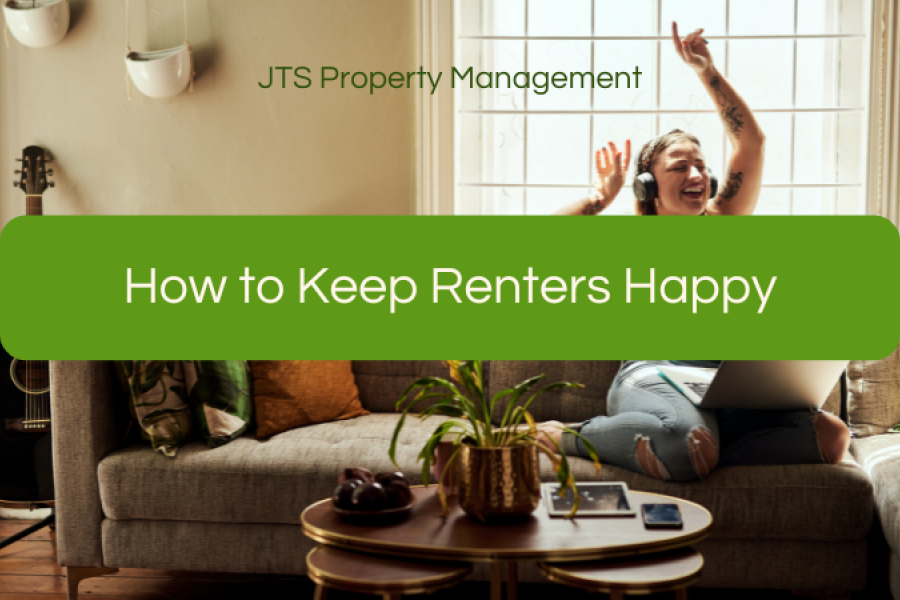Table of Contents
Ever find yourself wondering how to keep your renters not just content, but genuinely happy? It's a question many landlords grapple with, especially in today's competitive rental market.
In this article, we'll delve into some tried-and-true strategies that can help you cultivate happier tenants, leading to longer leases, fewer vacancies, and ultimately, a more successful rental business.
So, if you're ready to elevate your landlord game and develop a mutually beneficial relationship for you and your tenants, let's dive in!
Strategies for Tenant Satisfaction and Retention
Here are the tips to keep good renters happy and prevent them from leaving:
Provide Regular Updates
Keeping tenants informed and engaged through regular updates is crucial for fostering transparency, trust, and a sense of community within your rental property. Whether it's announcing upcoming maintenance activities, sharing relevant neighborhood news, or informing tenants about policy changes, regular communication demonstrates your commitment to keeping them informed and involved in the decision-making process.
Utilize various communication channels such as email newsletters, bulletin boards, or community meetings to disseminate information effectively and encourage feedback and participation from tenants.
Offer Flexible Payment Options
Providing tenants with flexible payment options can help alleviate financial stress and accommodate their individual needs and preferences. Offering various payment methods such as online payments, automatic bank transfers, or multiple payment schedules allows tenants to choose the option that works best for them and ensures timely rent payments.

Moreover, being open to discussing alternative payment arrangements in cases of financial hardship demonstrates empathy and flexibility, fostering goodwill and trust between landlords and tenants.
Show Appreciation
Demonstrating appreciation for your tenants through thoughtful gestures and acts of recognition can strengthen the landlord-tenant relationship and foster a sense of belonging and loyalty within your rental community.
Simple gestures such as sending thank-you notes, organizing tenant appreciation events, or offering small tokens of appreciation on special occasions can go a long way in making tenants feel valued and appreciated. Additionally, acknowledging and rewarding tenant loyalty through incentives or discounts for lease renewals or referrals can further reinforce their commitment to staying long-term.
Swift Maintenance Response
Tenants appreciate a landlord who takes their concerns seriously, especially when it comes to maintenance issues. Timely response to maintenance requests not only ensures their comfort and safety but also demonstrates your commitment to maintaining the property in good condition.
Implementing a streamlined system for reporting and addressing maintenance issues promptly can help prevent minor problems from escalating into major headaches for both you and your tenants. Remember, a proactive approach to maintenance not only preserves the value of your property but also fosters trust and satisfaction among your renters.

Tenant-Centric Amenities Insight
Understanding your tenants' preferences and lifestyle can help you tailor the amenities and services offered at your property to better meet their needs and enhance their overall satisfaction. Conducting surveys or engaging in casual conversations with your tenants can provide valuable insights into the amenities they value most, whether it's high-speed internet, laundry facilities, outdoor spaces, or pet-friendly policies.
By investing in amenities that align with your tenants' desires, you not only increase their satisfaction with the rental property but also differentiate yourself in a competitive market and attract and retain quality tenants for the long term.
Exemplary Landlordship
Being a good landlord goes beyond just collecting rent on time. It involves cultivating positive relationships with your tenants based on trust, respect, and clear communication. Being approachable and responsive to your tenants' needs and concerns creates a welcoming environment where they feel valued and heard.
Additionally, handling any disputes or issues with professionalism and empathy can help prevent conflicts from escalating and maintain a harmonious living atmosphere.
Proactive Lease Management
Proactively initiating discussions about lease renewals well in advance demonstrates your commitment to retaining good tenants and maintaining stability within your rental property. By reaching out to tenants before their lease expiration dates, you provide them with ample time to consider their options and express any concerns or preferences regarding their living arrangements.

This proactive approach not only fosters a sense of security and continuity for your tenants but also allows you to plan ahead and mitigate the risks associated with vacancies.
Lease Extension Incentives
Encouraging tenants to sign longer lease agreements can offer mutual benefits for both parties involved. Longer lease terms provide stability and predictability for both landlords and tenants, reducing the need for frequent turnover and minimizing the hassle and costs associated with finding new renters.
By incentivizing longer leases through discounts, rent freezes, or other perks, you can incentivize tenants to commit to staying for an extended period, thereby enhancing their sense of belonging and investment in the property.
Equitable Tenant Treatment
Fair treatment is fundamental to fostering a positive landlord-tenant relationship and ensuring tenant satisfaction and retention. Treating all tenants with respect, dignity, and equality regardless of their background or circumstances creates a welcoming and inclusive living environment where everyone feels valued and respected.
Fair treatment extends to aspects such as rent adjustments, lease terms, maintenance requests, and dispute resolutions, where consistency, transparency, and fairness should prevail.
Balanced Rule Enforcement
While it's essential to establish rules and guidelines to maintain order and safety within your rental property, it's equally important to enforce them with a balanced and reasonable approach. Striking the right balance between enforcing rules and being overly strict can help foster a positive living environment where tenants feel respected and valued.
Communication is key—clearly communicate your expectations and rules to tenants from the outset and ensure they understand the consequences of violating them. However, be mindful of being overly rigid or punitive, as this may lead to resentment or conflict.
Wrapping Up
In conclusion, fostering tenant happiness is not just about maintaining properties—it's about building relationships and creating a sense of community. By implementing the strategies outlined in this guide, landlords can cultivate happier tenants, leading to increased satisfaction, lower turnover rates, and ultimately, a more successful rental business.
At JTS Property Management, we understand the importance of tenant satisfaction, and our dedicated team is here to assist landlords in implementing these practices effectively, ensuring a positive rental experience for both landlords and tenants alike.


